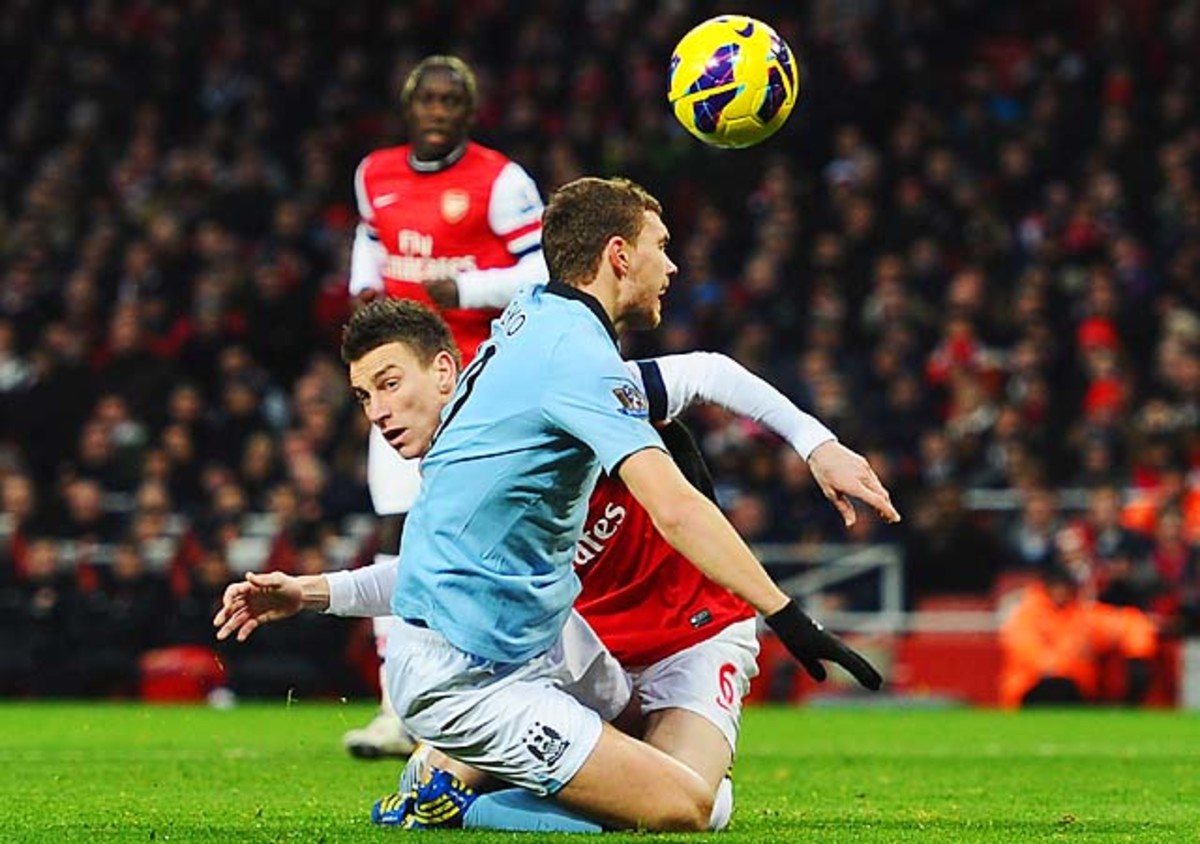Arsenal's problems go beyond referee's borderline decision

Laurent Koscielny fouled Edin Dzeko in the ninth minute, earning a red card and a City penalty.
Mike Hewitt/Getty Images
There was something refreshing about Arsene Wenger's take on the red card shown to Laurent Koscielny nine minutes into Arsenal's 2-0 loss to Manchester City on Sunday. For once -- and this is a criticism directed at virtually all managers, not Wenger in particular -- he didn't take the easy way out and blame the referee.
It would have been simple -- justified up to a point, even -- to say that the game had effectively been decided by Mike Dean's decision to send Koscielny off. That the defender committed a foul by hauling Edin Dzeko down is beyond doubt, but there is a question as to whether Koscielny denied him a clear goal-scoring opportunity; Dzeko, after all, did not have control of the ball and would have had to bring it down before Wojciech Szczesny came to clear.
For what it's worth, I thought the card was harsh but understandable. If you commit a cynical foul on the edge of the six-yard box, sympathy is never going to be plentiful. The foul -- like the one for which Vincent Kompany was dismissed later on -- existed in that broad gray (orange?) area where either red or yellow is justifiable. (And while we're discussing the incident, can we please put paid to the idea that the referee should have kept it at 11 against 11 so that he didn't ruin the spectacle for the crowd and TV audience? The rules are there to keep cheating and dangerous play to a minimum; it may have made that one game more of a spectacle to have shown clemency, but it would have been to the detriment of football as a whole.)
But Wenger didn't take the easy way out. He said he "refused" to watch the replay, implying that he didn't care how justified the decision was.
"What do I make of the decision?" said Wenger, whose club sits in sixth in the Premier League. "That is not really important. You have to live with the decision."
And he is right: decisions, good or bad, happen, and the best teams deal with them.
Football isn't always fair, but life isn't always fair. There are two ways of dealing with setbacks: whine about them and blame others; or try and make the most of the situation and get over the problem. Too often footballers and football managers turn to the excuse rather than the solution.
Far more significant -- and far more controllable -- than whether Dean erred fractionally on the side of harshness is why Koscielny allowed Dzeko to get goalside of him and, having done so, why then panic and drag down a player who still had to pluck a difficult ball out of the air with a foot not noted for its subtlety of touch?
Koscielny's laxness was part of a more general deficiency, one that continues to haunt Arsenal. It's a commonplace to say Arsenal as a team is mentally weak, but that's not quite accurate. Given all the setbacks of recent years it is in fact remarkably resilient. And yet it retains a capacity for self-destructive laxity that -- even in this slapstick age of Premier League defending -- remains remarkable.
"Overall we started too timid, with not enough authority in a game like that, and allowed them to dictate," Wenger said. "We didn't start with enough confidence or authority. It is frustrating because the team showed great heart and desire after that, but we were a bit too nervous to play in a serene way at home, and that is costing us. It is not anger, it is frustration that we do not see from the start what this team is capable of."
The problem now is that the timorousness had become self-perpetuating. The Emirates is a nervous stadium; Arsenal fans have come to expect the worst, and their anxiety is pervasive. That combines with the more general restlessness, the unease with Arsenal's place in the world, to make home games a jittery trial. Wenger stopped short of criticizing Arsenal fans but asked whether the tense atmosphere was part of the problem, he acknowledged that "it doesn't help."
Yet it's understandable that Arsenal fans feel dissatisfied. Most clubs have a reasonably clear sense of where they stand in the world, of what sort of league position they should be achieving. Arsenal got used to winning titles in the early days under Wenger and were sold the move to the Emirates on the promise that increased capacity meant increased revenue which would enhance their ability to compete with the likes of Manchester United. Initially, though, they were told that interest repayments on the loan would curtail transfer activity, and since then the likes of Roman Abramovich and Sheikh Mansour have arrived to transform the financial landscape. Top players will no longer accept the "socialist" wage structure at Arsenal and, as the dream of trophies won by beautiful football recedes, so there is even less incentive for them to stay. Fans, meanwhile, are asked to recalibrate expectations.
As Zach Slaton's analysis in Issue Seven of The Blizzard showed, Arsenal actually overperforms given expenditure. Little wonder fans are confused and little wonder that bafflement becomes edginess. For there is another paradox: Arsenal may be overperforming, and yet it commits so many silly individual errors it's hard not to feel it should be doing better than it is.
At least, though, Wenger is addressing the issue of mentality and is trying to put the problem right rather than taking the soft option and hiding behind futile debate over a borderline refereeing decision.





